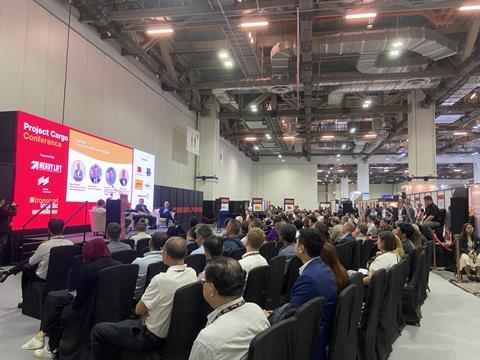The inaugural Project Cargo Conference took place last week on November 3 at the transport logistic Southeast Asia & air cargo Southeast Asia exhibition in Singapore.

The morning session kicked off with a panel chaired by HLPFI editor David Kershaw looking at the impact of China-plus-one sourcing strategies on the project logistics sector. Panellists included Liew Teck Liong, chief financial officer at AAL Shipping; DHL Industrial Projects’ vice president, Asia Pacific Michael Mulvenna; Sumeet Ghildiyal, director project logistics, Singapore and India at Geodis; and FLS Group ceo Torbjörn Larisch.
There was broad consensus among our panellists that a greater degree of China-plus-one sourcing strategies are being seen in the heavy industrial manufacturing sector, with India a particular beneficiary. North Asia and China will remain a core market, but supply chain resilience is increasingly considered by manufacturers – the shift will be a super-marathon, not a sprint.
The degree to which the shift takes place will also affect some of the APAC region’s project hotspots, which were also discussed at length, with energy of all varieties analysed, in the second panel of the morning. This session saw Edgare Kerkwijk (board member at the Asia Wind Energy Association), Felix Schoeller (director at AAL Shipping), Florian Pinz (managing director, Singapore and Malaysia at Blue Water Shipping) and Frederic Pagniez (managing director at Dextra Industry & Transport) share their insights into what industry verticals and regions will provide work for the project logistics community in the coming years, from wind energy projects, LNG developments, growth in the FPSO segment, as well as an uptick in petrochemical and oil and gas activity.
In the afternoon, a lively debate from Susana Germino (general manager, sustainability and decarbonisation at Swire Shipping), SK Lim (managing director Pacific at G2 Ocean), and Lars Vetterlein (regional head marine chartering APAC at DHL Industrial Projects) got to grips with some of the challenges facing the region’s multipurpose and heavy lift ship operators. Margins are tighter than 12 months ago but ships remain busy; caution and calm heads were called for when considering the merits of EU ETS surcharges and potential fuels of the future.
Other supply chain risks facing project logisticians were discussed at length in our final panel with Trans Global Projects’ director, Australia, Ashleigh Schwarz and Mike Schoofs, global head of renewable and energy logistics at Kuehne + Nagel. They discussed the importance of exporters staying alert to Australian biosecurity measures to avoid a repeat of port disruption; raising the profile and championing the merits of the industry to attract and retain talent; and the role of greater digitalisation to stay abreast of environmental and compliance requirements.
HLPFI would like to thank all those that attended the conference throughout the day as well as our speakers and sponsors, which included AAL Shipping, Blue Water Shipping, DHL Industrial Projects, Fracht Group and Kuehne + Nagel. More details of each session will be published in HLPFI’s January/February 2024 edition of the magazine.
















